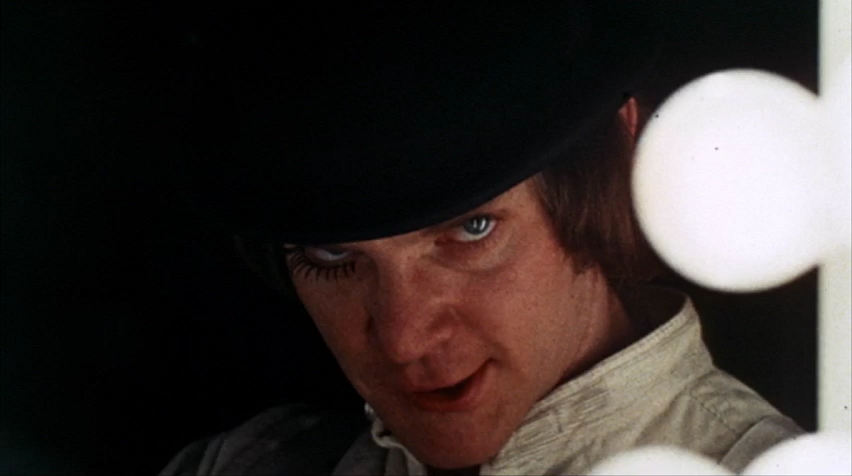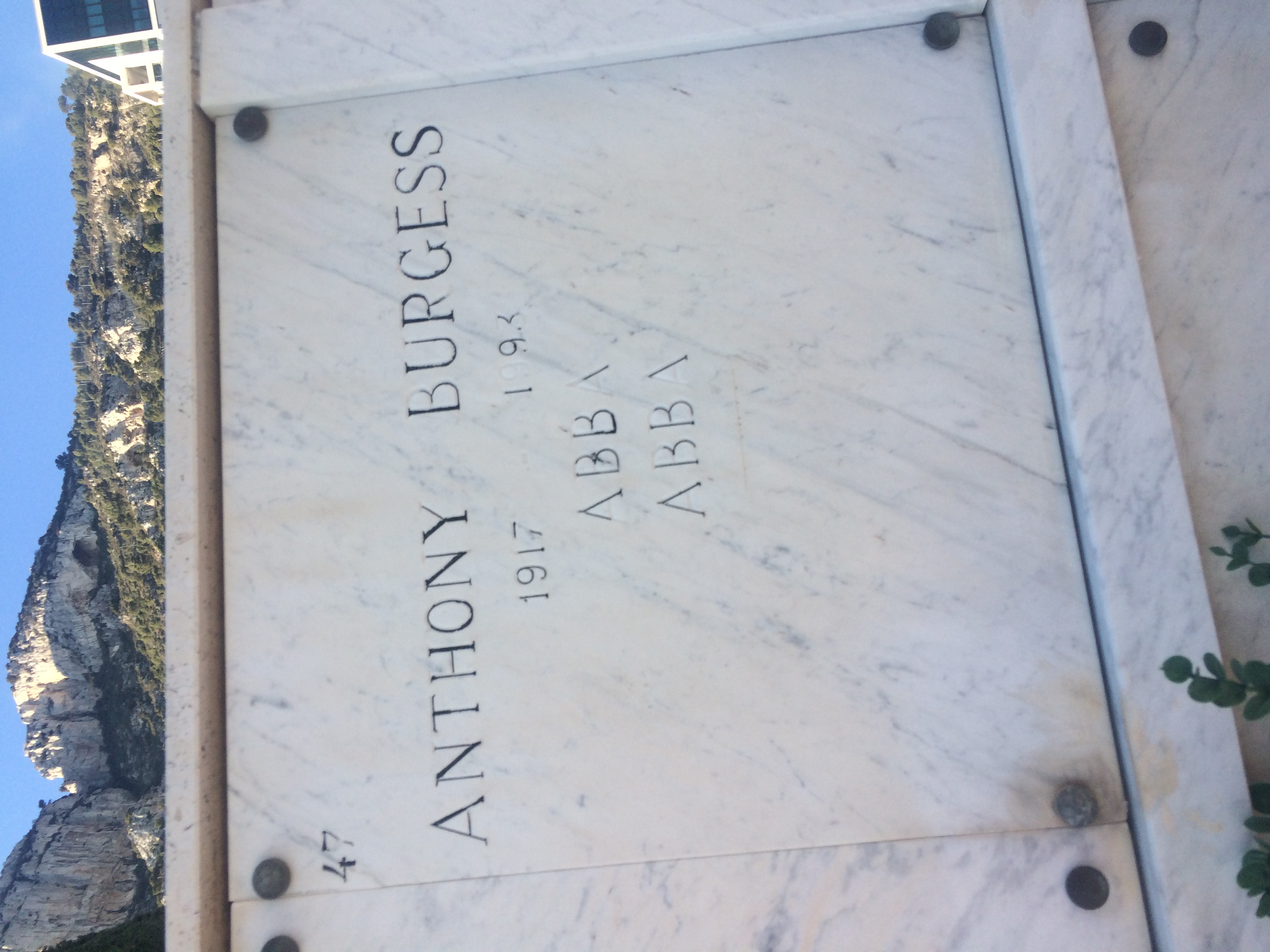|
Nadsat
Nadsat is a fictional register or argot used by the teenage gang members in Anthony Burgess's dystopian novel '' A Clockwork Orange''. Burgess was a linguist and he used this background to depict his characters as speaking a form of Russian-influenced English. The name comes from the Russian suffix equivalent of ''-teen'' as in ''thirteen'' (, ). Nadsat was also used in Stanley Kubrick's film adaptation of the book. Description Nadsat is a mode of speech used by the ''nadsat'', members of the teen subculture in the novel '' A Clockwork Orange''. The narrator and protagonist of the book, Alex, uses it in first-person style to relate the story to the reader. He also uses it to communicate with other characters in the novel, such as his ''droogs'', parents, victims and any authority-figures with whom he comes in contact. As with many speakers of non-standard varieties of English, Alex is capable of speaking standard English when he wants to. It is not a written language: the ... [...More Info...] [...Related Items...] OR: [Wikipedia] [Google] [Baidu] |
A Clockwork Orange (novel)
''A Clockwork Orange'' is a dystopian satirical black comedy novel by English writer Anthony Burgess, published on March 17, 1962. It is set in a near-future society that has a youth subculture of extreme violence. The teenage protagonist, Alex, narrates his violent exploits and his experiences with state authorities intent on reforming him. The book is partially written in a Russian-influenced argot called " Nadsat", which takes its name from the Russian suffix that is equivalent to '-teen' in English. According to Burgess, the novel was a '' jeu d'esprit'' written in just three weeks. In 2005, ''A Clockwork Orange'' was included on ''Time'' magazine's list of the 100 best English-language novels written since 1923, and it was named by Modern Library and its readers as one of the 100 best English-language novels of the 20th century. The original manuscript of the book has been kept at McMaster University's William Ready Division of Archives and Research Collections in Ham ... [...More Info...] [...Related Items...] OR: [Wikipedia] [Google] [Baidu] |
Anthony Burgess
John Anthony Burgess Wilson, (; 25 February 1917 – 22 November 1993) who published under the name Anthony Burgess, was an English writer and composer. Although Burgess was primarily a comic writer, his Utopian and dystopian fiction, dystopian satire ''A Clockwork Orange (novel), A Clockwork Orange'' remains his best-known novel. In 1971, it was A Clockwork Orange (film), adapted into a controversial film by Stanley Kubrick, which Burgess said was chiefly responsible for the popularity of the book. Burgess produced a number of other novels, including the Inside Mr Enderby, Enderby quartet, and ''Earthly Powers''. He wrote librettos and screenplays, including the 1977 television mini-series ''Jesus of Nazareth (miniseries), Jesus of Nazareth''. He worked as a literary critic for several publications, including ''The Observer'' and ''The Guardian'', and wrote studies of classic writers, notably James Joyce. A versatile linguist, Burgess lectured in phonetics, and translated ... [...More Info...] [...Related Items...] OR: [Wikipedia] [Google] [Baidu] |
A Clockwork Orange (film)
''A Clockwork Orange'' is a 1971 dystopian fiction, dystopian crime film adapted, produced, and directed by Stanley Kubrick, based on Anthony Burgess's A Clockwork Orange (novel), 1962 novel. It employs disturbing and violent themes to comment on psychiatry, juvenile delinquency, youth gangs, and other social, political, and economic subjects in a dystopian near-future Britain. Alex (A Clockwork Orange), Alex (Malcolm McDowell), the central character, is a charismatic, anti-social delinquent whose interests include classical music (especially that of Ludwig van Beethoven, Beethoven), committing rape, theft, and "ultra-violence". He leads a small gang of thugs, Pete (Michael Tarn), Georgie (James Marcus (English actor), James Marcus), and Dim (Warren Clarke), whom he calls his ''droogs'' (from the Russian language, Russian word друг, which is "friend", "buddy"). The film chronicles the horrific crime spree of his gang, his capture, and attempted rehabilitation via an experime ... [...More Info...] [...Related Items...] OR: [Wikipedia] [Google] [Baidu] |
Argot
A cant is the jargon or language of a group, often employed to exclude or mislead people outside the group.McArthur, T. (ed.) ''The Oxford Companion to the English Language'' (1992) Oxford University Press It may also be called a cryptolect, argot, pseudo-language, anti-language or secret language. Each term differs slightly in meaning; their uses are inconsistent. Etymology There are two main schools of thought on the origin of the word ''cant'': * In linguistics, the derivation is normally seen to be from the Irish word (older spelling ), "speech, talk", or Scottish Gaelic . It is seen to have derived amongst the itinerant groups of people in Ireland and Scotland, who hailed from both Irish/Scottish Gaelic and English-speaking backgrounds, ultimately developing as various creole languages. However, the various types of cant (Scottish/Irish) are mutually unintelligible. The Irish creole variant is termed " the cant". Its speakers from the Irish Traveller community know it as ... [...More Info...] [...Related Items...] OR: [Wikipedia] [Google] [Baidu] |
Rhyming Slang
Rhyming slang is a form of slang word construction in the English language. It is especially prevalent among Cockneys in England, and was first used in the early 19th century in the East End of London; hence its alternative name, Cockney rhyming slang. In the US, especially the criminal underworld of the West Coast of the United States, West Coast between 1880 and 1920, rhyming slang has sometimes been known as Australian slang. The construction of rhyming slang involves replacing a common word with a phrase of two or more words, the last of which rhymes with the original word; then, in almost all cases, omitting, from the end of the phrase, the secondary rhyming word (which is thereafter implied), Bryson, a humourist, states that there is a special name given to this omission: "the word that rhymes is almost always dropped... There's a technical term for this process as well: hemiteleia". Given that this is a genus of plant species, and appears in no readily available sources a ... [...More Info...] [...Related Items...] OR: [Wikipedia] [Google] [Baidu] |
Cockney Rhyming Slang
Rhyming slang is a form of slang word construction in the English language. It is especially prevalent among Cockneys in England, and was first used in the early 19th century in the East End of London; hence its alternative name, Cockney rhyming slang. In the US, especially the criminal underworld of the West Coast between 1880 and 1920, rhyming slang has sometimes been known as Australian slang. The construction of rhyming slang involves replacing a common word with a phrase of two or more words, the last of which rhymes with the original word; then, in almost all cases, omitting, from the end of the phrase, the secondary rhyming word (which is thereafter implied), Bryson, a humourist, states that there is a special name given to this omission: "the word that rhymes is almost always dropped... There's a technical term for this process as well: hemiteleia". Given that this is a genus of plant species, and appears in no readily available sources as a linguistic term, it is unc ... [...More Info...] [...Related Items...] OR: [Wikipedia] [Google] [Baidu] |
Stanley Kubrick
Stanley Kubrick (; July 26, 1928 – March 7, 1999) was an American filmmaker and photographer. Widely considered one of the greatest filmmakers of all time, Stanley Kubrick filmography, his films were nearly all adaptations of novels or short stories, spanning a number of genres and gaining recognition for their intense attention to detail, innovative cinematography, extensive set design, and Black comedy, dark humor. Born in New York City, Kubrick taught himself film producing and directing after graduating from high school. After working as a photographer for ''Look (American magazine), Look'' magazine in the late 1940s and early 1950s, he began making low-budget short films and made his first major Hollywood film, ''The Killing (film), The Killing'', for United Artists in 1956. This was followed by two collaborations with Kirk Douglas: the List of anti-war films, anti-war film ''Paths of Glory'' (1957) and the Epic film, historical epic film ''Spartacus (film), Spartacus' ... [...More Info...] [...Related Items...] OR: [Wikipedia] [Google] [Baidu] |
Alex (A Clockwork Orange)
Alex is a fictional character and the protagonist in Anthony Burgess' novel '' A Clockwork Orange'' and Stanley Kubrick's film adaptation of the same name, in which he is played by Malcolm McDowell. In the book, Alex's surname is not stated. In the film, however, Kubrick chose it to be DeLarge, a reference to Alex calling himself The Large in the novel. Later on in the film, two newspaper articles print his name as "Alex Burgess", a reference to Anthony Burgess. In addition to the book and film, Alex was portrayed by Vanessa Claire Smith in the ARK Theatre Company's multimedia adaptation of ''A Clockwork Orange'', directed by Brad Mays. Character overview Alex is the narrator in the novel '' A Clockwork Orange''. The character is portrayed as a thrill-seeking sociopath who robs, rapes, and assaults innocent people for his own amusement. Intellectually, he knows that such behaviour is morally wrong, saying that "you can't have a society with everybody behaving in my manner of ... [...More Info...] [...Related Items...] OR: [Wikipedia] [Google] [Baidu] |
Constructed Language
A constructed language (shortened to conlang) is a language whose phonology, grammar, orthography, and vocabulary, instead of having developed natural language, naturally, are consciously devised for some purpose, which may include being devised for a fiction, work of fiction. A constructed language may also be referred to as an artificial, planned or invented language, or (in some cases) a fictional language. ''Planned languages'' (or engineered languages / engelangs) are languages that have been purposefully designed; they are the result of deliberate, controlling intervention and are thus of a form of ''language planning''. There are many possible reasons to create a constructed language, such as to ease human communication (see international auxiliary language and code); to give fiction or an associated constructed setting an added layer of realism; for experimentation in the fields of linguistics, cognitive science, and machine learning; for artistic language, artistic crea ... [...More Info...] [...Related Items...] OR: [Wikipedia] [Google] [Baidu] |
Vernacular
Vernacular is the ordinary, informal, spoken language, spoken form of language, particularly when perceptual dialectology, perceived as having lower social status or less Prestige (sociolinguistics), prestige than standard language, which is more codification (linguistics), codified, institutionally promoted, literary language, literary, or formal. More narrowly, a particular language variety that does not hold a widespread high-status perception, and sometimes even carries social stigma, is also called a vernacular, vernacular dialect, nonstandard dialect, etc. and is typically its speakers' native language, native variety. Regardless of any such stigma, all nonstandard dialects are full-fledged varieties of language with their own consistent grammatical structure, phonology, sound system, body of vocabulary, etc. Overview Like any native language variety, a vernacular has an internally coherent system of grammar. It may be associated with a particular set of vocabulary, and sp ... [...More Info...] [...Related Items...] OR: [Wikipedia] [Google] [Baidu] |
Filler (linguistics)
In linguistics, a filler, filled pause, hesitation marker or planner (sometimes called crutches) is a sound or word that participants in a conversation use to signal that they are pausing to think but are not finished speaking.Juan, Stephen (2010).Why do we say 'um', 'er', or 'ah' when we hesitate in speaking? These are not to be confused with placeholder names, such as ''thingamajig''. Fillers fall into the category of formulaic language, and different languages have different characteristic filler sounds. The term filler also has a separate use in the syntactic description of wh-movement constructions (see below). Usage Every conversation involves turn-taking, which means that whenever someone wants to speak and hears a pause, they do so. Pauses are commonly used to indicate that someone's turn has ended, which can create confusion when someone has not finished a thought but has paused to form a thought; in order to prevent this confusion, they will use a filler word such ... [...More Info...] [...Related Items...] OR: [Wikipedia] [Google] [Baidu] |
King James Bible
The King James Version (KJV), also the King James Bible (KJB) and the Authorized Version (AV), is an Early Modern English translation of the Christian Bible for the Church of England, which was commissioned in 1604 and published in 1611, by sponsorship of King James VI and I. The 80 books of the King James Version include 39 books of the Old Testament, 14 books of Apocrypha, and the 27 books of the New Testament. Noted for its "majesty of style", the King James Version has been described as one of the most important books in English culture and a driving force in the shaping of the English-speaking world. The King James Version remains the preferred translation of many Protestant Christians, and is considered the only valid one by some Evangelicals. It is considered one of the important literary accomplishments of early modern England. The KJV was the third translation into English approved by the English Church authorities: the first had been the Great Bible (1535), ... [...More Info...] [...Related Items...] OR: [Wikipedia] [Google] [Baidu] |





